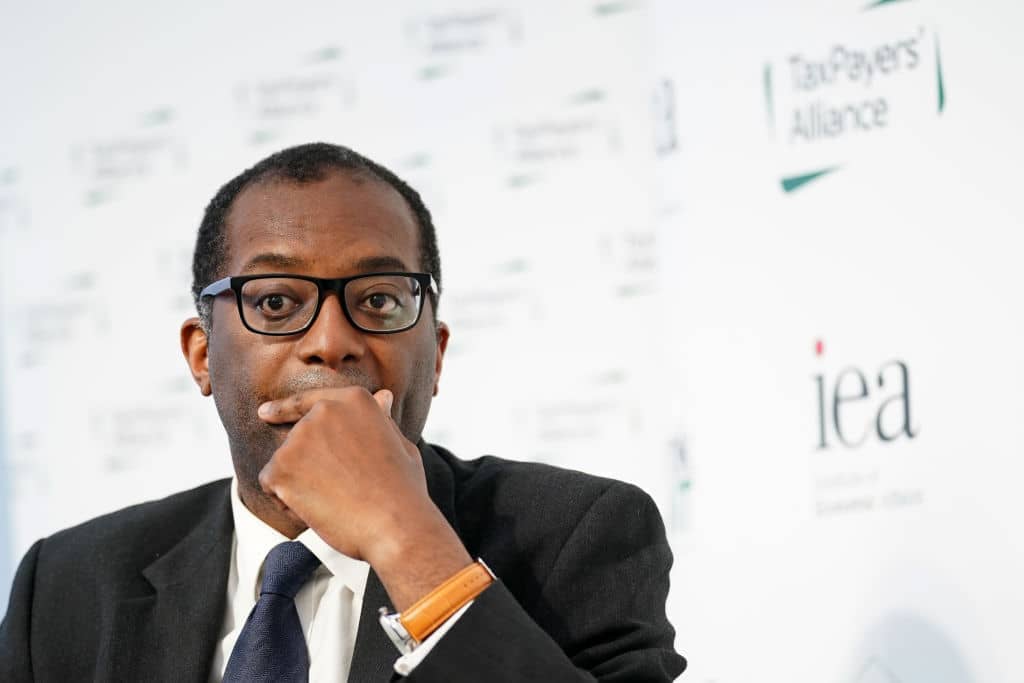When Liz Truss and Kwasi Kwarteng entered Downing Street, laser focus was not only applied to them, but also to the free market think tanks they had worked with over the years. This evening, Kwarteng paid a visit to two of them, as the Institute of Economic Affairs and The Taxpayers’ Alliance hosted the Chancellor at Conservative party conference for one-on-one conversations.
Similar to his speech yesterday, Kwarteng used the opportunity to try to take some heat out of his mini-Budget. When asked if market reaction was part of the Treasury orthodoxy he and Truss had been taking aim against for weeks, he shook his head and pointed to the ‘global context’ instead. He had some extremely kind works for the Bank of England’s governor Andrew Bailey – another institution the Truss government has been picking fights with. ‘I think he’s a very fine governor,’ Kwarteng insisted: ‘I think we’ve got to let him do his job.’
Having worked at the IEA for four years, this was the most enthusiastic I’ve seen the ThinkTent about a Chancellor
Perhaps most notably, the Chancellor iterated several times that he is sticking to the 2021 comprehensive spending review, and will be working off it when it comes time for his medium-term fiscal plan announcements on 23 November. ‘It’s a good discipline to stick to what we said,’ he told the audience in the ThinkTent venue, also insisting it would take months to do another CSR. This suggests departments will be facing real-term spending cuts once inflation is taken into account — a point the Chancellor did not deny. Might any departments get topped up? Kwarteng singled out two departments that he was ‘committed’ to protecting, which are also the two areas Truss committed to on the campaign trail: health and social care, as well as defence.
While Kwarteng paid some lip service to fiscal discipline, it is clear that he is still far more relaxed about spending than his predecessor Rishi Sunak. ‘We do need to have a disciplined approach,’ he said,’ ‘but at the same time we’ve got to recognise that we’ve got to fund public services.’ He defended his decision to roll back the tax hikes that were implemented by Sunak to cover some of the UK’s substantial rise in borrowing. Talking about the 72-year high tax burden, he said:
We spent a huge amount of money [during Covid], as we should have done… and the view was we have to raise the money in tax. And the logic of that got us to where we are, which I didn’t think was sustainable.
When asked how he’d like to be judged in a year’s time, the Chancellor insisted his growth target of 2.5 per cent is the most important metric. ‘Everyone’s talking about growth now’, he said. He was confident that ‘there can be an immediate impact’ on the growth figures: while his optimal target might be some way off, he cited investment zones as a policy that could immediately give growth figures a boost.
Plenty of questions went unanswered, especially around the debate over uprising benefits in line with inflation, which the Chancellor insisted would come in next month’s announcement. Separate to a direct question about benefits, he did note that he believes the government ‘have an obligation to help vulnerable people,’ drawing attention to the government’s Energy Price Guarantee as evidence that the government could be trusted to see that principle through.
Having worked at the IEA for four years, this was the most enthusiastic I’ve seen the ThinkTent about a Chancellor – no real surprise, as the broad free market think tank response to the mini-Budget was overwhelmingly positive. The real test for Kwarteng, however, will be when he returns to parliament and his audience extends far wider than the grassroots.







Comments